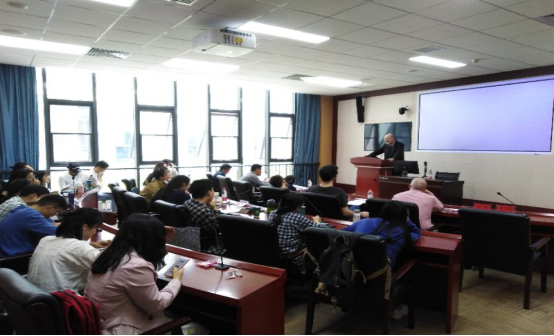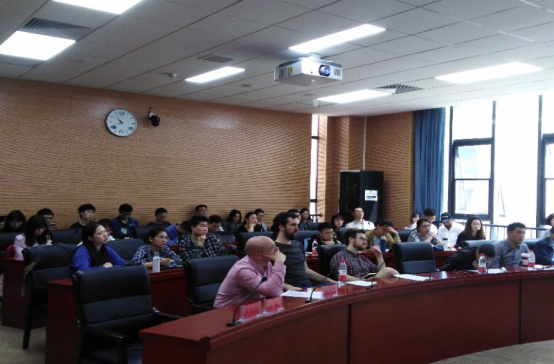Professor Michael Sherwin, professor and holder of the chair in Fundamental Moral Theology (French language section), University of Fribourg, visited School of Philosophy, Wuhan University. Professor Sherwin gave a lecture “The Way of Excellence: Thomas Aquinas' understanding of virtue acquisition and moral development” on April 18th in room B214, Zhenhua Building. Scholars and more than 40 students from School of Philosophy participated in the lecture.

On the lecture, professor Sherwin demonstrated that according to St. Thomas Aquinas, perfect happiness, which is the ultimate goal of human life is attainable only in heaven in the communal vision of God in the heavenly kingdom, nevertheless the character of happiness as an activity points to the unique characteristics of the steps on the way to happiness. Human actions that follow the path leading to the ultimate goal participate already in the end. Human actions are not fullness, but are ordered toward the fullness, and participate already in it. An act of virtue is a foretaste of a perfect act of virtue. Professor Sherwin afterwards showed the misreading of St. Thomas’ teaching on this topic can be avoided by a careful understanding of the Latin term habitus, whose descendants in modern European languages do not mean what habitus primarily means in Latin. St. Thomas employed the term habitus to signify a richer and more interesting psychological experience. The dispositional effect of the habitus of virtue does not limit freedom of restrict action, but empowers the virtuous person to act with excellence and creative freedom when confronted with each new situation. Drawing on the understanding of Alasdair MacIntyre, professor Sherwin illustrated St. Thomas’ explanation of the acquisition of virtue and moral development by means of analogies with the arts and sports, investigated the distinction between speculative and practical reasoning within St. Thomas’ virtual ethics. Giving Ludwig Wittgenstein’s critics of private language, Professor Sherwin further clarify the crucial role that habitus and practical moral activities play in St. Thomas’ ethics. The lecture was concluded with a discussion between the audience and professor Sherwin about the continuation and development of St. Thomas’ ethics referring to Aristotelian understanding.

On April 16th, professor Sherwin also presented an academic seminar on “The Transformation of Virtues: A theory of infused virtue”. Some teachers and the students from School of Philosophy participated in the seminar. In the seminar, professor Sherwin talked about the characteristics of theological virtues and cardinal virtues in St. Thomas’ view. Professor Sherwin defended St. Thomas’ theory of infused cardinal virtues against the popular and influential misinterpretation of St. Thomas which makes a sharp distinction between them: theological virtues are infused by God, while cardinal virtues are acquired by human effort. Offering textual evidences and a concrete example, professor Sherwin illustrated how St. Thomas understands the relationship between the theological virtues and the infused cardinal virtues. He showed further that for St. Thomas, although the Christian have received the infused cardinal virtues, they must live these virtues from within the theological virtues of faith, hope and love. Professor Sherwin argued that St. Thomas affirms that by living the life of grace the Christian gradually integrate his personality – his acquired habits and dispositions – into the life of infused virtue ordered toward the love of God and the kingdom of heaven. To conclude the seminar professor Sherwin underlined the ways in which St. Thomas’ theory of virtue draws on aspects of Augustine’s thought to overcome important limitations in both Aristotelian and contemporary conceptions of virtue.(Written by Xu Yuming)



